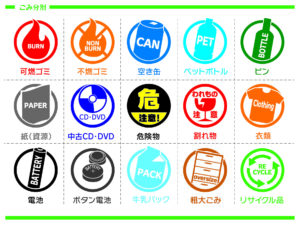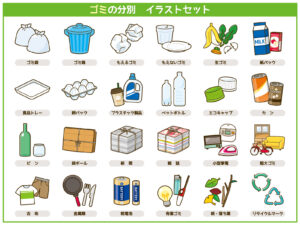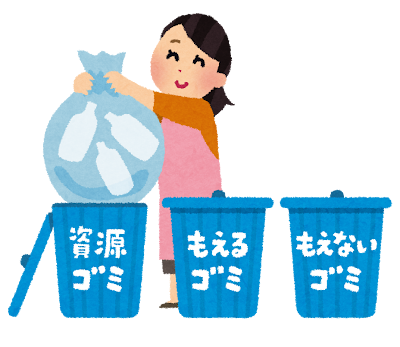Waste Separation Shapes the Future: How Japan Leads the Way Toward a Sustainable Society
The Reasons Behind Japan’s Detailed Waste Separation Rules
Resource Limitations in Japan’s Unique Context
Japan is a country with limited natural resources, heavily reliant on imports for energy and raw materials. To address this, recycling plays a crucial role in maximizing resource efficiency. For instance, plastics and aluminum can be reused, retaining their value through careful sorting.
Additionally, as an island nation with limited landfill space, reducing waste itself is a top priority. This philosophy of minimizing waste and maximizing resource use is a key driver of Japan’s meticulous waste separation system.

Environmental Awareness and Legal Frameworks
The strictness of Japan’s waste separation also stems from growing environmental concerns. The “dioxin issue” in the 1990s prompted a significant reevaluation of incineration practices and spurred the push for plastic sorting.
Key laws like the Container and Packaging Recycling Law (2000) and the Home Appliance Recycling Law have played a pivotal role in standardizing and enforcing detailed separation rules across the country.
These legal measures have encouraged municipalities to adopt more precise sorting systems, embedding them into everyday life.

The Benefits of Waste Separation
Improved Recycling Efficiency and Resource Circulation
Meticulous sorting greatly enhances recycling efficiency.
Separating plastics and metals from combustible waste ensures these valuable materials can be reused. Recycling facilities in Japan process sorted materials with high precision, resulting in high-purity resources. For example, technologies enable PET bottles to be recycled into new bottles or clothing, showcasing the system’s effectiveness.
Enhancing Community Environmental Awareness
Waste separation efforts naturally foster greater environmental awareness among residents. Municipalities distribute detailed guidelines and hold educational workshops, providing opportunities for communities to learn about environmental issues.
Some areas even involve residents in monitoring waste collection, which strengthens community bonds and promotes collective responsibility for environmental conservation. This approach transforms waste separation from a mere “rule” into a meaningful contribution to sustainability.

Comparing Japan’s Waste Separation to the World
Differences in Rules Across Countries
Compared to other nations, Japan’s waste separation rules stand out for their complexity. While countries like Germany and Sweden are also leaders in recycling, their systems are often less detailed.
For instance, they typically collect recyclable materials together and rely on advanced machinery for sorting.
In contrast, Japan emphasizes accurate sorting at the household level to ensure high-quality recycling outcomes.
Japan’s Advanced Technology and Management Systems
Japan’s waste management technology is globally renowned. Incinerators are designed to minimize environmental impact, and waste-to-energy systems are widely adopted in urban areas. Furthermore, cutting-edge recycling technologies enable the efficient processing of sorted materials.
These innovations underpin Japan’s ability to implement and sustain such detailed waste separation practices.
The Future of Waste Separation
How New Technologies Are Revolutionizing Recycling
Artificial intelligence (AI) and robotic technologies are being increasingly utilized to automate waste sorting, potentially simplifying household responsibilities. Additionally, breakthroughs in biotechnology are enabling the development of materials like biodegradable plastics and innovative recycling techniques.
As these technologies become more widespread, waste separation could become even more efficient and less burdensome in the future.
Toward Simpler and More Efficient Waste Sorting
There is also growing recognition of the need to simplify complex separation rules.
Municipalities and companies are exploring methods like unified collection of all plastics or systems where QR codes provide instant sorting instructions.
Such efforts aim to make waste separation more accessible and user-friendly, ensuring its long-term sustainability.
Waste Separation Shapes the Future: How Japan Leads the Way Toward a Sustainable Society
Japan’s detailed waste separation system plays a vital role in resource conservation and environmental protection.
This system is supported by a combination of legal frameworks, technological advancements, and community involvement.
As technology evolves and policies are refined, Japan’s approach to waste separation will continue to improve.
It serves as a model for the world, demonstrating how meticulous efforts can drive a more sustainable future for everyone.


